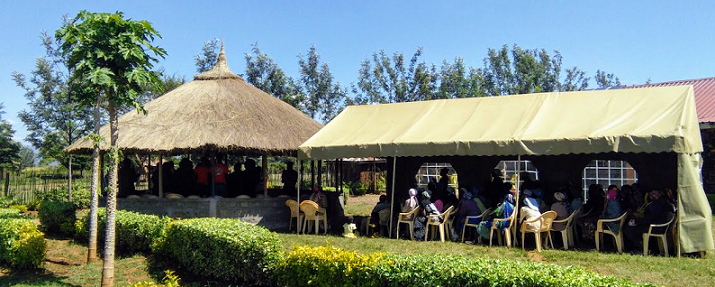

Our aim as a charity is to help to raise the living standards of the whole community.
While our medical and farming programs are working to improve people's health and income, our community support programs fill in the gaps by helping to improve conditions for the most vulnerable and introducing initiatives to help make daily life easier for everyone.
We play a very important role in the communities we serve and our facilities act as a hub for the local area.
The most vulnerable people in rural Kenya are the elderly, the disabled and children. We run ongoing support programs for these groups to ensure that they can access the facilities and services needed to overcome their disadvantage.
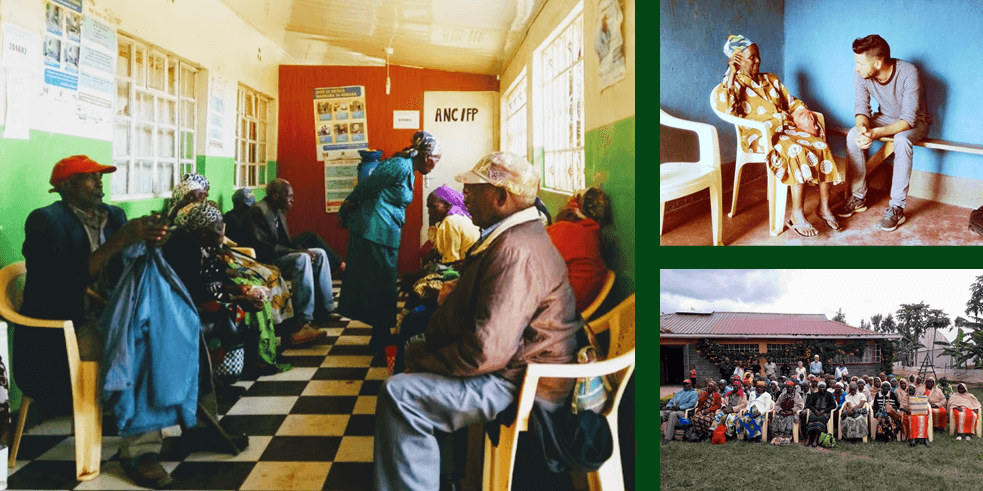
Elderly people in rural Kenya often live in extreme povery, suffering from malnutrition, untreated medical issues (high blood pressure, arthritis, osteoporosis), loneliness and physical neglect.
Since 2016 we have run monthly social gatherings for the elderly. As well as being a social outlet where they get a hot nutritious meal, we provide the following free services:
There has been huge enthusiasm for this program among the elderly, with 70-100 regular attendees. They meet at our medical centre and thus become more visible members of the community.

Disability is still a taboo subject in Kenya, so disabled people are often hidden away to live isolated lives without social interaction or medical treatment.
We offer the following supports to disabled people and their carers from both of our centres:
As a result of this program (running since 2012) disabled people in our community are now accepted and acknowledged as having a positive contribution to make to society. This sea change has made a difference in so many lives and benefits not just the disabled people themselves but also their entire families.
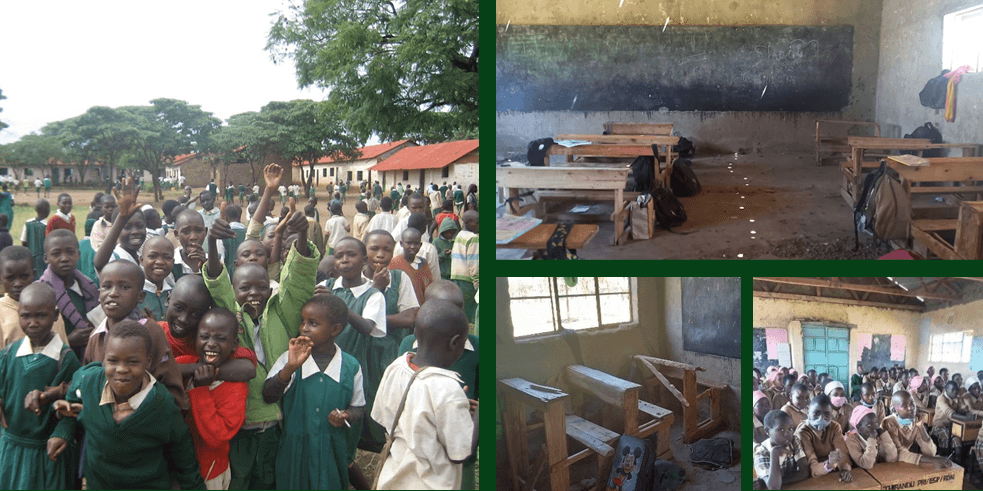
Education in Kenya costs a lot. As well as fees (for secondary school), the cost of extra items can be too much for many families and so their children don't attend school. Extra items can include books, stationery, uniforms, bags, food, desks, extra teachers' salaries, mattresses, etc.
We run two education programs* which provide funding and support for vulnerable children who would otherwise not receive any education. Some have been abandoned or orphaned and some come from abusive or extremely poor households.
Having the opportunity to attend school gives these children a new opportunity for a brighter future.
Through this program we have seen children progress from primary school to secondary school and 8 have even gone on to university (a pipe dream for so many in Kenya); we are enormously proud of their amibition & perseverence.
* Davis Education Program - funded by Anne Davis, her family and friends in memory of Simon Davis
* Fr Fachtna Education Program - funded by the estate of the late Fr Fachtna Staunton
Banking facilities are almost non-existent in rural Kenya, making access to cash or credit very difficult.
Mobile phones are now used extensively to transfer money for all kinds of transactions - a solution which works well to solve the cash issue but brings the problem of easy access to loan sharks. Banks charge high interest rates and are only in cities, while lack of collateral means many are not eligible for loans - particularly women who are the drivers of the local economy and who run the majority of small businesses.
Our finance programs aim to help people in the community to access the money they need to improve their standard of living.
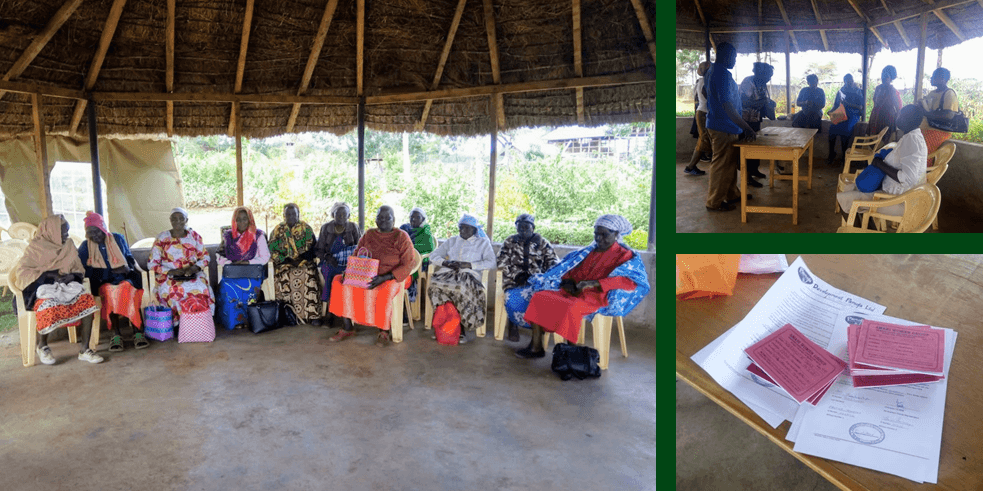
Table banking is a group funding initiative where members (often women) save into and take loans from a shared fund. Groups hold regular meetings, where they have full control over their fund and set their own rules.
With small groups, members have a strong sense of collective responsibility. It is in everybody's interest to keep up repayments / contributions and to help those in difficulty.
We have helped to set up a number of these groups to whom we provide the following services;
These table banking groups have proven to be very successful and participants are now more financially secure - they can cope with large/unexpected bills and have the means to make business or household improvements.
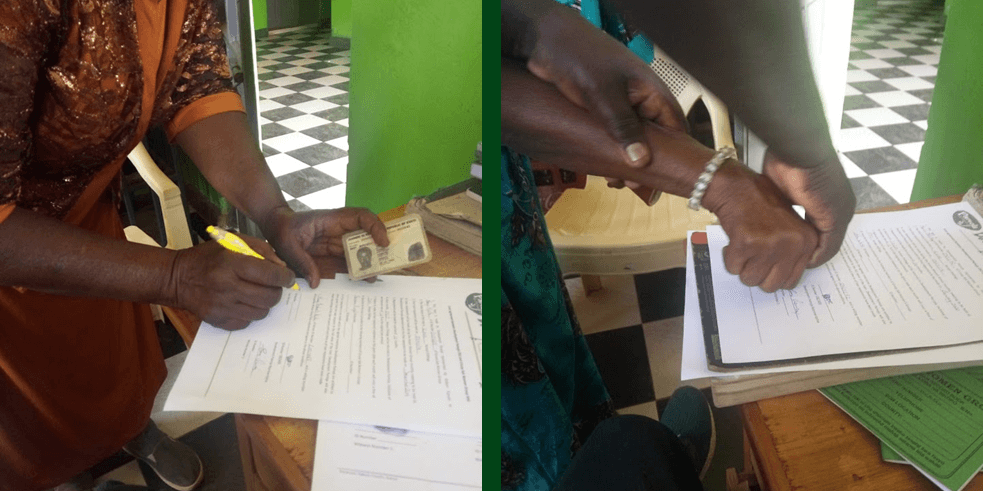
Micro-finance schemes in Kenya are often plagued by poor compliance and high default rates - particularly when provided by charities (from whom people are used to getting things for free).
Table banking is therefore our preferred method of ensuring that funding is accessible in the community.
However, we do provide micro-finance loans in limited circumstances as follows:

On the equator it gets dark every evening at 6pm, and people have to use paraffin lamps to light their homes. These lamps cause many problems:
With no electricity, people have to walk miles to charge their phones; this is an issue because mobile phones are used extensively to make payments for all kinds of transactions in lieu of cash (there are no banks or ATMs in the area).
Solar lamps are a cheap, safe and reliable way of lighting homes. They cost €20 and can be installed in individual homes quickly and easily. They allow children to do homework, mothers to cook and do other chores and everyone to enjoy reading - and they can also charge mobile phones.
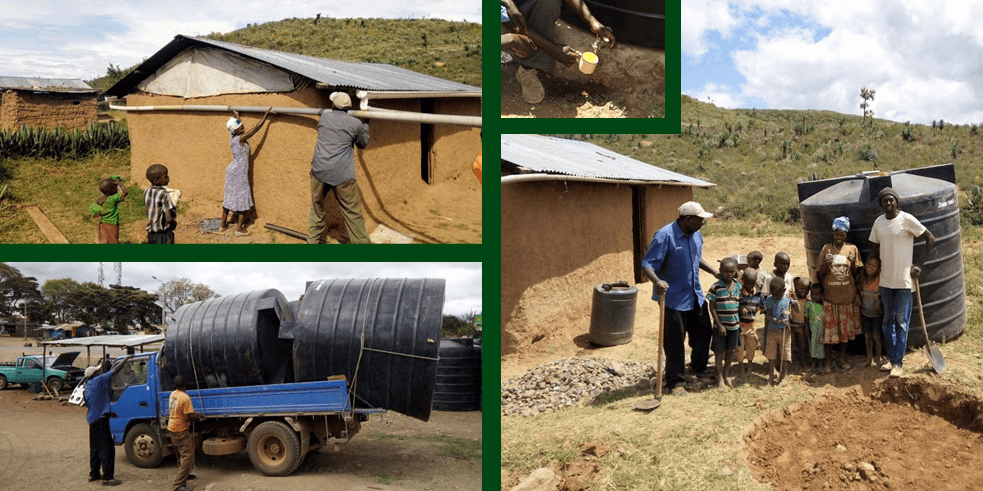
Access to clean water is a huge problem; the local rivers are far away, they often run dry and the water is contaminated (diarrhoea, typhoid and dysentery are common as a result). Since the groundwater in the area is salty, the only solution to this problem is rainwater harvesting.
We provide families with household water tanks that allow them to collect rainwater from their roofs - water which is safe to drink.
The participants contribute towards the cost of the tanks and they are trained on how to maintain the tanks and guttering.
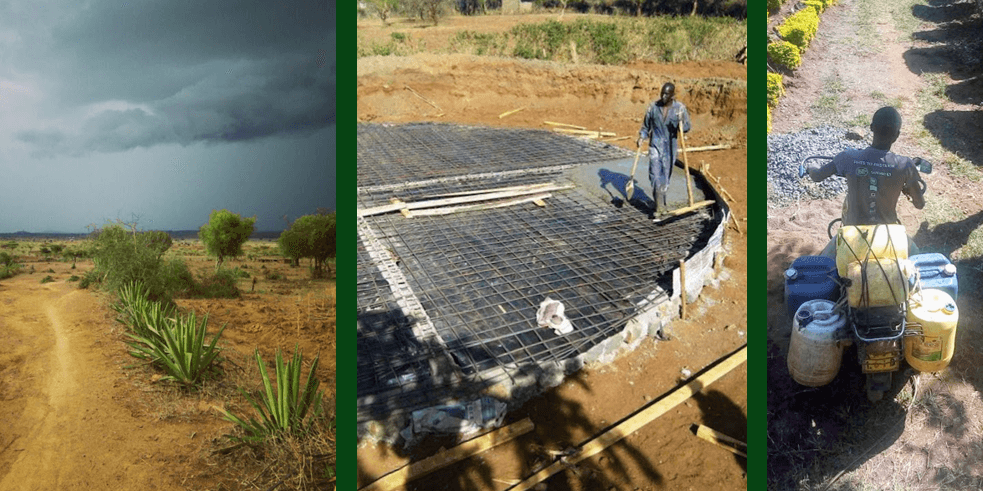
There is no source of clean water in the areas we work; river water is contaminated, unreliable and is labour intensive.
In some areas, public access to water can be provided by digging a borehole. Our groundwater is salty so that is not an option for us - large-scale rainwater collection is the only alternative.
We have a large (300,000 litre) underground tank on our farm which collects rainwater from the roofs of our buildings. The water is then filtered to ensure it is of the highest quality before being sold at the water kiosk on our farm. We charge a nominal cost for this water - a precious resource - to discourage wastage.
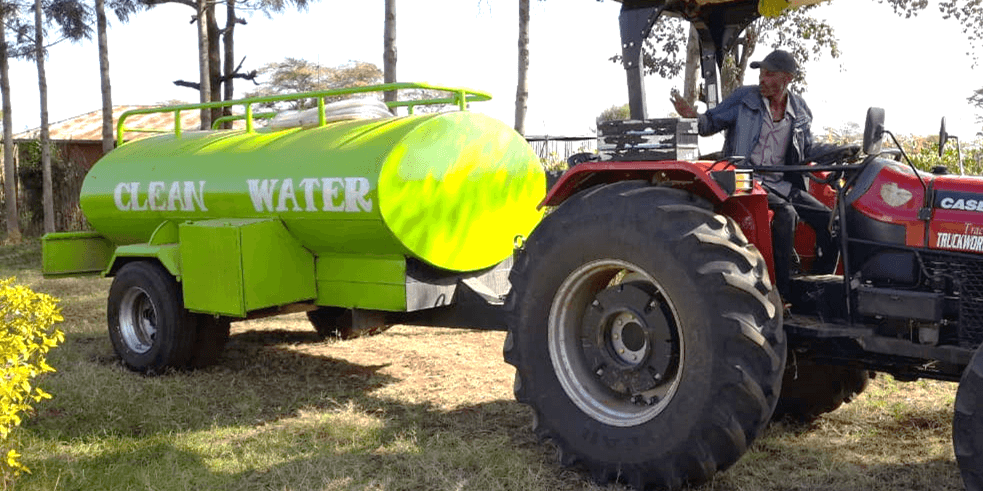
The use of household water tanks and farmyard wells to collect and store rainwater means that families and farmers are better able to ensure they have adequate water supply for the dry season.
However, in times of extreme drought these can still run dry. When this happens we use our large water tanker to refill tanks and ponds from our underground tank or the local river. A nominal fee is charged to cover fuel.
This is a truly life-saving service which is having a profound effect on water security in the area.
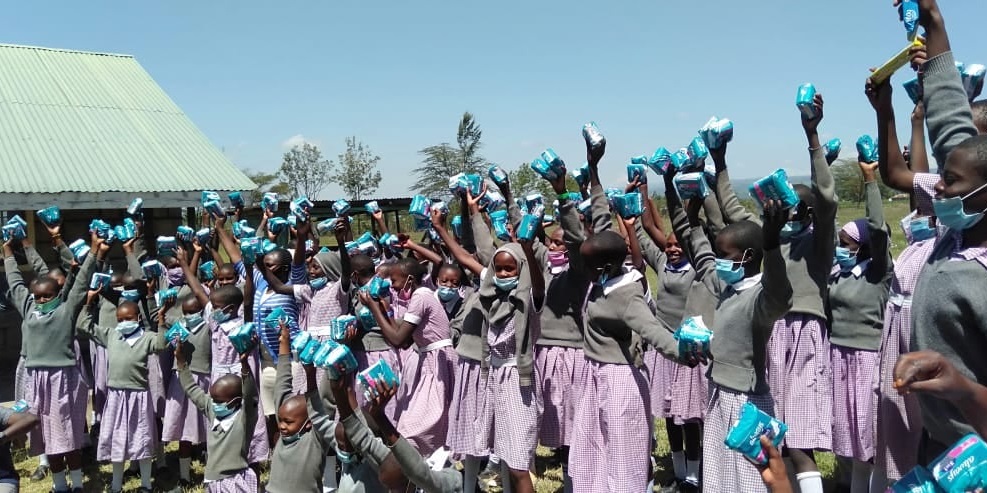
Period poverty is a big problem in rural Kenya, where most young girls have no information on or access to menstrual hygiene products. As well as the social stigma, this also affects their education - missing school 4-5 days per month puts these girls at a distinct disadvantage.
We have partnered with an Irish company called We Are Riley who are committed to tackling this important issue by sponsoring a Menstruation Education Programme in local schools. Our doctor Mary gives regular health talks in primary and secondary schools where she distributes basic sanitary products and helps to demystify the issue by teaching girls how to manage their periods. So far we have reached over 2200 girls.
We include boys in our talks to help them understand the issues affecting their female family / friends and it helps reduce the taboo associated with this subject.
We Are Riley also supply basic sanitary products to our medical centres for distrubition in the community and to vulnerable girls and members of our disability program.

Our organisation plays a central role in the communities we serve and we regularly facilitate and give contributions towards community events.
The Community Event Area (a covered pavillion) on our Sarambei farm, along with large rooms in our Rongai Medical Centre are regularly used for these occasions and we supply gazebos when required. Some examples of such events are as follows:
We also make occasional donations to local community groups when they have specific needs - e.g. sports equipment, school upgrades, group uniforms, etc.
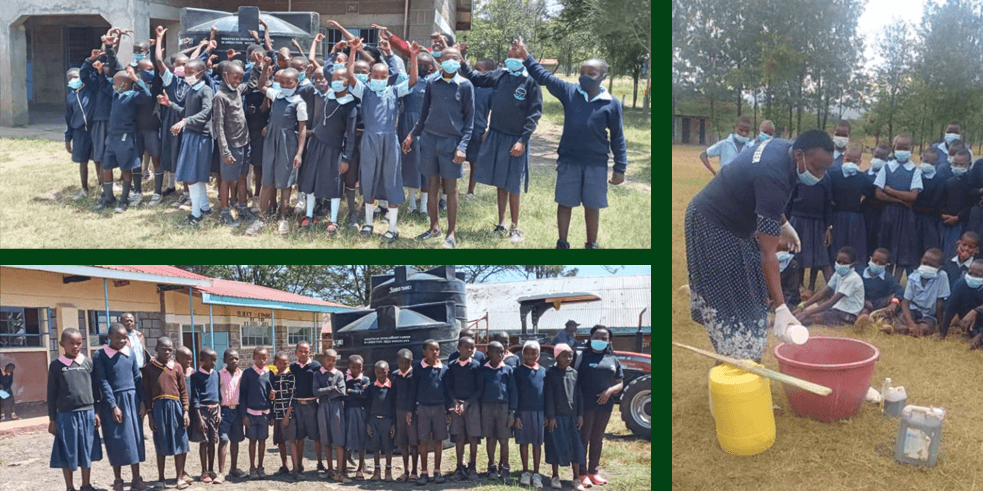
Many schools in rural Kenya do not have access to clean water, so children are expected to provide their own water for drinking and washing. Not only is this a heavy burden, the water they bring from home is often dirty.
We have installed large (5000 litre) rainwater harvesting tanks in many local schools and we also provide soap-making materials and training.
This means that all children can drink clean water during the day and also ensures that proper hygiene practices can be maintained.

In the remote areas we work public health education is severely lacking; sanitation is non-existent and water-borne diseases are common. Another serious issue in this patriarchal society is gender-based violence.
We have set up a Public Health Unit in Rongai to address these issues; 10 community health volunteers were recruited, trained & given supplies and are now engaging with the public & local schools to provide training in the following areas:
This public health unit also assists with vaccination & screening programs, monitoring & reporting of any public health issues (e.g. cholera outbreaks), training of additional community health volunteers, provision of water tanks in schools, distribution of mosquito nets & motorbike reflectors.
As the global pandemic has taught us all: prevention is better than cure.

While we don't believe that giving free aid is beneficial to the community in the long-term, there are often exceptional circumstances where it is the right thing to do. The following are some examples of emergency aid that we provide occasionaly:
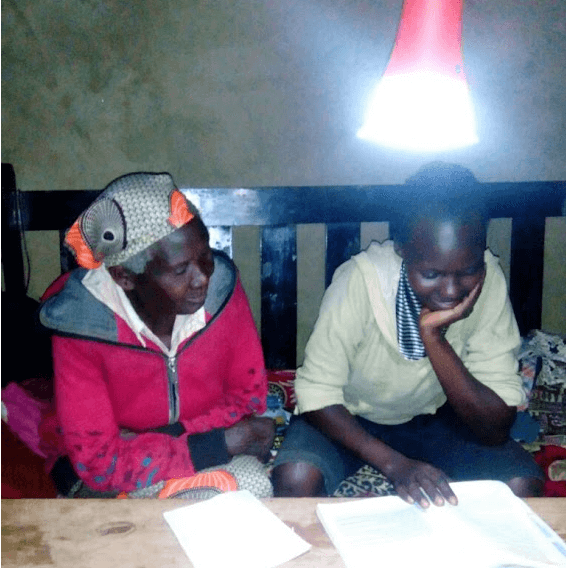
67 year old widow & sheep farmer who cares for her 3 grandchildren
"The solar lamp gives light for my grandchildren to study and lets me charge my phone so that I can sell my sheep. My neighbours pay to charge their phones so now I have some extra income to help us.
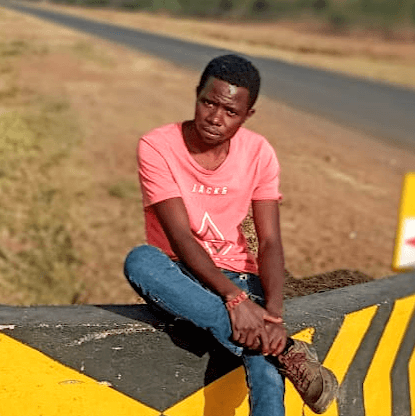
Development Pamoja Employee
Education Program
I'm Brian. I'm a fresh graduate of Egerton University (Bsc. Economics Statistics). Development Pamoja's education program paid my school fees throughout secondary school and univeristy. Now I am working with the organisation to enable me acquire more experience in employment.
I'm thankful to the organisation for providing the environment to prove my self worth in education and to be a future aspiring professional.
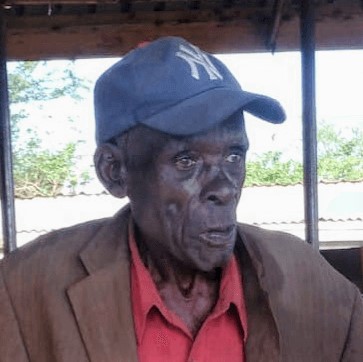
90+ years old
Elderly Program
Ofwana lives on his own and has no family nearby. He attends our medical centre regularly as well as our monthly social gatherings and we help him with daily living costs.
.jpg)
.jpg)
.jpg)
.jpg)
.jpg)
.jpg)
.jpg)
.jpg)
.jpg)
.jpg)
.jpg)
.jpg)
.jpg)
.jpg)
.jpg)
.jpg)
.jpg)
.jpg)
.jpg)
.jpg)
.jpg)
.jpg)
.jpg)
.jpg)
.jpg)
.jpg)
.jpg)
.jpg)
.jpg)
.jpg)
.jpg)
.jpg)
.jpg)
.jpg)
.jpg)
.jpg)
.jpg)
.jpg)